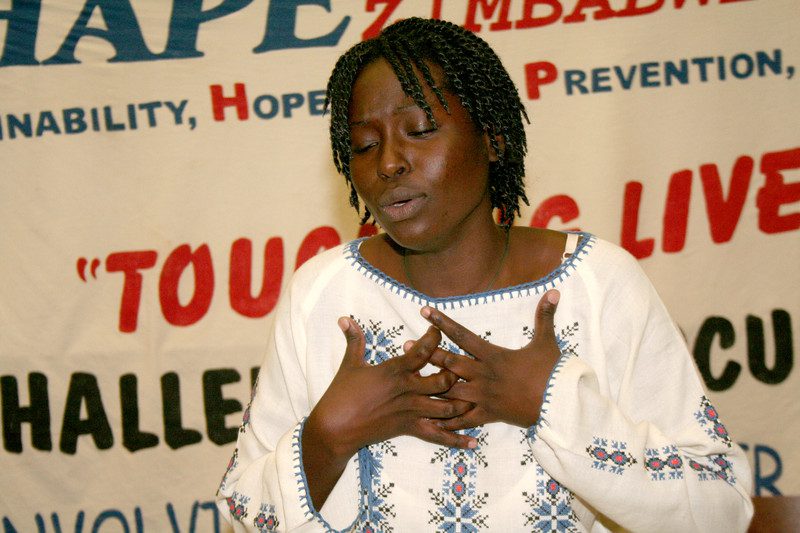A beacon of hope
A group of university students in Zimbabwe attempts to tackle the country’s HIV crisis by improving relations between men and women.
“You’re standing on the bank of a river and must cross the bridge to get to the life that awaits you on the other side,” Leo Wamwanduka tells a crowd of young men and women, which has started to build on the forecourt of the Zimbabwe’s Midlands State University (MSU).
“In the water are all sorts of dangers like crocodiles and hippos that are waiting for you to fall in. If you cross safely you will be well rewarded. If you fall, don’t worry, we will add another bridge to help you get safely to the other side.”
While in reality the river, crocodiles and hippos are actually lawn, wooden poles and paper cut-outs, the message behind them and what they represent remains the same — protect yourself from HIV and other sexually transmitted infections (STIs) and you will live a long and healthy life.
It is innovative ideas like “the bridge” which defines SHAPE Zimbabwe Trust, one of our partner organisations in Zimbabwe. SHAPE (Sustainability, Hope, Action, Prevention, Education), is an organisation created by university students for university students. Its aim is to help students understand how their behaviour and actions directly affect their risk of contracting HIV.
Leo Wamwanduka is SHAPE’s program manager at MSU in Gweru, Zimbabwe’s third-largest city, located about 300km west of Harare. Since 2004, Oxfam Australia has been supporting SHAPE’s Gender, Masculinities and HIV project at the campus — a project which is so successful, it has been replicated in three other universities.
The reasons for its success are simple. It’s not moralistic, it doesn’t set out to lecture students about the “rights and wrongs” of their behaviour and it’s not led by adults; instead it takes into account the realities of students’ lives and gets them to actively participate in a process of change.
SHAPE’s work is another beacon of hope for a country in turmoil. Zimbabwe is the first country in Southern Africa to show a drop in HIV prevalence, down from 24.6% of adults in 2003 to 20.1% in 2005 (UNDP). Even so, prevalence among young people remains high, with 16.2% of people aged 15–24 living with HIV, the bulk of them young women (Central Statistical Office Harare).
SHAPE’s Gender, Masculinities and HIV project aims to reduce the spread of HIV among young people by challenging traditional gender roles that condone risky sexual behaviour among men and reinforce women’s lower status, thus limiting their ability to negotiate safer sex. It does this by providing a platform for students to openly and freely discuss things such as HIV, sex, condoms, gender roles and sexual harassment, without fear of ridicule or judgement.
“Not all of us come from backgrounds where you can talk freely about AIDS, sex, STIs or protection — not all of our parents are able to tell us or some of us are orphans,” says Daisy Chimanga, a second-year African languages student. “But SHAPE Zimbabwe really helps. Here we can talk openly about it.”
The SHAPE program has many aspects. Students take part in training courses, workshops and campus debates, organise concerts, rallies and sporting events, set up support groups, and create newsletters, fact sheets and even musical CDs.
Students are also encouraged to become gender activists around campus to share their knowledge about HIV and AIDS and gender with other students. Men take part in masculinities training to understand their own behaviour and improve their attitudes towards gender equality; women receive assertiveness training to help them negotiate more equal relationships with men and not succumb to peer pressure. This is followed up with training in reproductive health, HIV and AIDS, counselling and interpersonal communication, and support to develop action plans to bring about change.
Willard Barure, a second-year marketing student at MSU, became involved with SHAPE soon after he started university. For Willard, university life was a freedom he had never experienced. He became violent, volatile and insensitive, drank excessively, had multiple sexual partners and, at one stage, almost got expelled. But then he attended a SHAPE talk show where he began to rethink his attitudes and behaviours. Soon after, he volunteered to go through masculinities training.
Now, he is a gender activist and counsellor with SHAPE, helping to organise events and campaigns around campus, facilitating discussions about gender and HIV in students’ residence halls, and counselling students by sharing his own story and helping them to focus on their lives.
“My involvement with SHAPE saved me. It provided me with an escape route where I could focus on myself and on my strengths, rather than on my limitations. I now feel useful and important as an individual. All in all I am now the architect of my life.”
In its first three years at MSU, SHAPE trained 180 female students and 120 male students, signed up an additional 200 members and reached out to more than 5,000 members of the university community through its activities and events.
Leo says that one of SHAPE’s biggest challenges is to help students maintain their positive behaviours away from the university world.
Learn more
- Our work in Zimbabwe
- Our work on HIV and AIDS
How you can help
Donate now and help us continue our life-saving work.
